9 Greatest Squat Alternate options for Decrease Physique Mass & Power
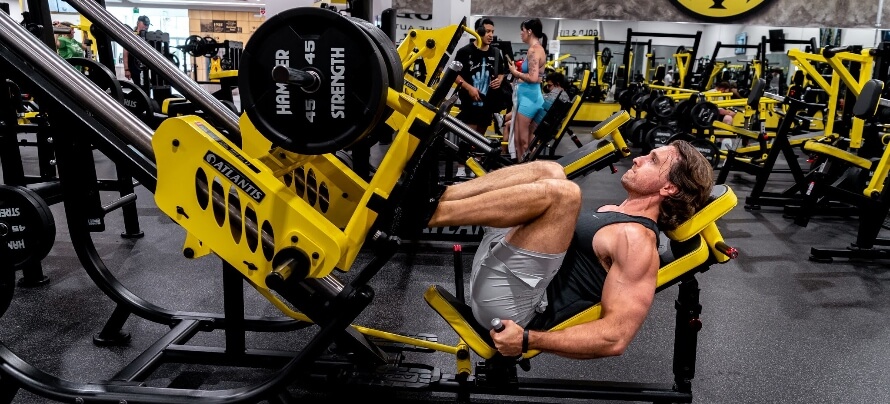
Many health “specialists” say it’s important to squat to construct robust, outlined legs.
Not true.
The squat is a wonderful train, but when accidents stop you from squatting appropriately or comfortably, or squats simply aren’t your bag, there are many good barbell again squat options for constructing lower-body muscle and energy.
On this article, you’ll be taught 9 of the very best options to squats, why they’re efficient, and do them with correct type.
Key Takeaways
- The squat is efficient, however it’s not the one strategy to construct robust legs. When you have joint ache, accidents, or favor different workout routines, there are many stable squat differents.
- The perfect squat differents are straightforward to carry out and cut back stress on the backbone, knees, and different joints, offering a extra easy and comfy possibility for many who discover conventional again squats tough or painful.
- Extremely efficient options to the barbell again squat embody the entrance squat, leg press, Bulgarian break up squat, step-up, lunge, trap-bar deadlift, Romanian deadlift, belt squat, and goblet squat.
Why Use Barbell Squat Alternate options?
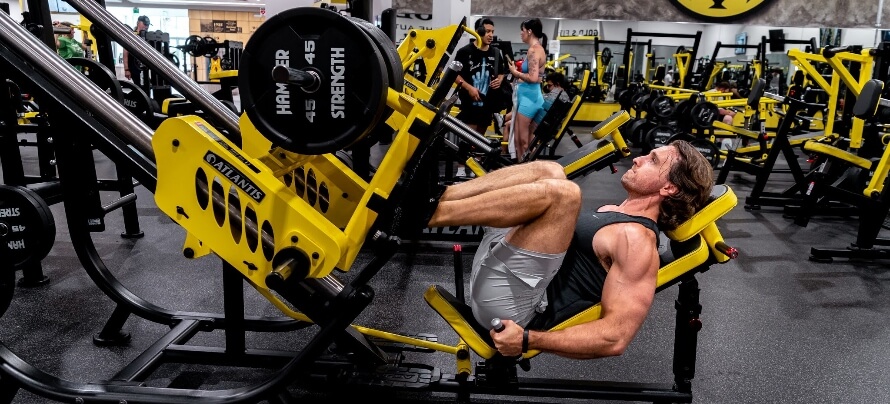
Most specialists think about the barbell again squat the “king of workout routines” as a result of no different motion trains as many muscle mass all through the physique. It additionally enables you to raise heavy weights safely and progress commonly, so it’s very best for gaining muscle and energy.
That stated, not everybody can or needs to barbell again squat.
For instance, these with decrease again issues might discover placing weight on their backbone uncomfortable. Equally, folks with knee points might discover it tough to bend their knees to 90 levels and past. In each circumstances, barbell again squats in all probability aren’t the very best answer.
Barbell again squatting isn’t at all times very best for newcomers, both. Some discover the method robust to grasp, whereas others battle to raise a 45-pound bar—the minimal required to carry out a barbell again squat.
Then there are those that merely don’t take pleasure in again squats and like different leg workout routines as an alternative.
And that’s the place barbell again squat options are available.
The perfect different squat workout routines cut back stress in your joints, providing a extra snug possibility for many who discover again squats uncomfortable. Additionally they are usually easier, so that they’re extra accessible than again squats.
Good squat options usually really feel distinct sufficient from the again squat to be extra palatable for many who dislike the train, too.
And crucially, they do all this with out sacrificing muscle or energy features.
In different phrases, the very best barbell again squat options enable you to construct measurement and energy with none of the downsides of barbell again squatting.
The 9 Greatest Barbell Again Squat Alternate options
Listed here are my 9 favourite options to the barbell again squat.
These workout routines are nice substitutes as a result of they practice all the identical muscle mass in your decrease physique—particularly the quads, hamstrings, and glutes—together with different main muscle teams just like the decrease again, calves, and core.
If barbell squats really feel like a battle, strive incorporating a few of these options into your routine. You’ll get all of the features with out the grief.
1. Entrance Squat
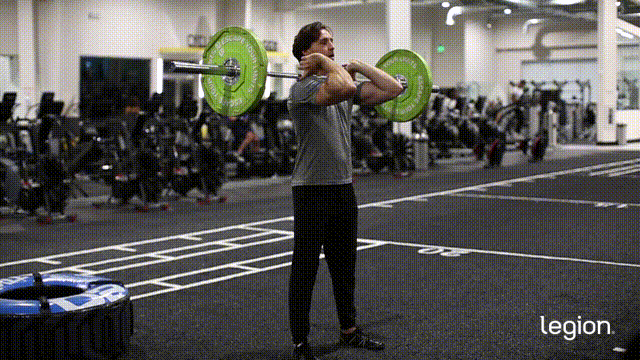
Why: The entrance squat is most specialists’ go-to barbell again squat different as a result of it trains the quads as successfully because the again squat, even whenever you use as much as 20% much less weight. It additionally locations much less compressive forces in your knees and decrease again, so it’s extra snug for individuals who have knee or again points.
If, after a number of weeks of making an attempt, you discover the entrance squat “rack place” painful in your shoulders and wrists, think about switching to a “cross-arm” grip, or substitute the entrance squat for an train that trains your physique equally, such because the Zercher squat or hack squat.
Learn how to:
- Place the barbell in a squat rack at concerning the peak of your breastbone.
- Grip the bar together with your fingers shoulder-width aside, palms dealing with away from you.
- Step nearer to the bar, so it rests in your higher chest, and lift your elbows in entrance of the bar.
- Carry the bar out of the rack, take 1-to-2 steps again, and place your ft barely wider than shoulder-width, toes turned barely out.
- Sit down, conserving your again straight, elbows up, and knees according to your toes.
- Stand again up and return to the beginning place.
READ MORE: Learn how to Entrance Squat: Kind, Advantages & Alternate options
2. Leg Press
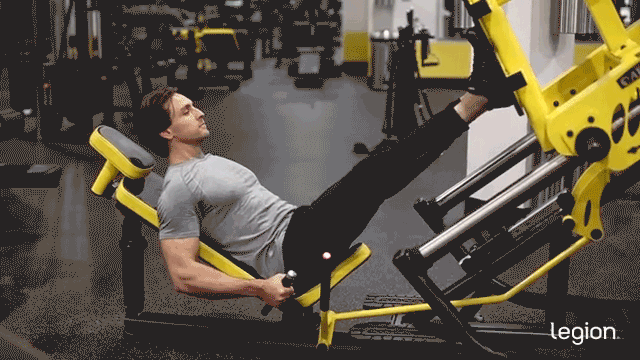
Why: The leg press is a wonderful different to barbell squats as a result of it trains all the identical decrease physique muscle mass, however doesn’t require you to steadiness or assist weight together with your higher physique and permits you to practice with heavier masses in comparison with free-weight leg workout routines.
This implies it’s excellent for gaining mass and energy, whereas being a lot gentler in your joints and delicate tissues.
Learn how to:
- Load the leg press machine with plates.
- Sit within the seat and wedge your butt down into the bottom.
- Place your ft midway up the footplate, barely wider than shoulder-width, with toes pointing barely out.
- Straighten your knees and use the security handles to launch the load.
- Decrease the footplate towards your chest, conserving your again straight and thighs about 10-to-12 inches out of your chest.
- Reverse the motion and return to the beginning place.
READ MORE: Learn how to Do the Leg Press: Advantages, Kind, & Alternate options
3. Bulgarian Cut up Squat
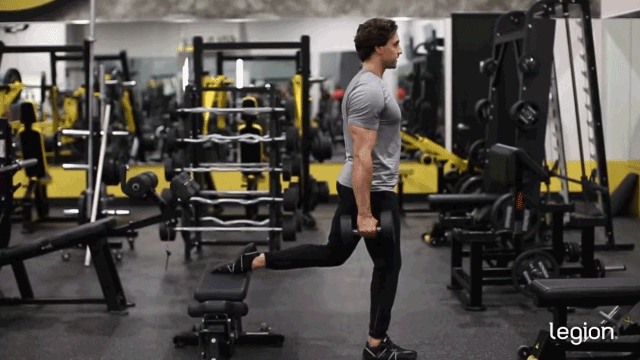
Why: The Bulgarian break up squat is a top-tier barbell again squat different as a result of it trains your whole decrease physique one leg at a time, so it’s nice for locating and fixing muscle imbalances and will even increase athletic efficiency greater than barbell squats.
Learn how to:
- Maintain a dumbbell in every hand and stand 2-to-3 ft in entrance of a bench, together with your again to it.
- Place your left foot on the bench behind you, conserving your proper foot and heel firmly planted.
- Decrease your physique by bending your proper knee, bringing your proper thigh parallel to the ground.
- Stand again up and return to the beginning place.
READ MORE: Learn how to Carry out Bulgarian Cut up Squats for Glutes, Hamstrings & Quad Progress
4. Step-Up
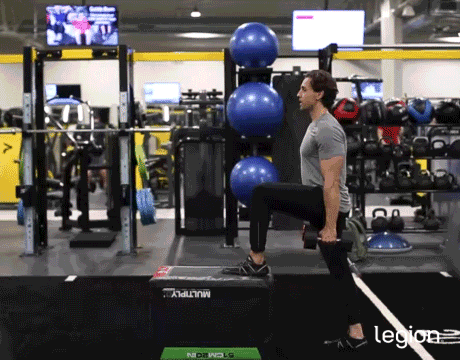
Why: The step-up is a first-rate barbell squat substitute as a result of it trains your whole decrease physique, together with your quads, glutes, and hamstrings. And because it doesn’t require you to raise heavy weights to be efficient, it’s kinder to your bones and joints.
Furthermore, analysis reveals that the dumbbell step-up is a improbable “accent” train to the squat—it allows you to achieve muscle and energy that enhances your squat efficiency with out inserting practically as a lot pressure in your physique.
Learn how to:
- Maintain a dumbbell in every hand and place your left foot on a sturdy floor about knee-height off the ground.
- Hold your weight in your left foot and absolutely straighten your left leg.
- Decrease your proper foot towards the ground and return to the beginning place.
READ MORE: Weighted Step-Ups Information: Learn how to Do Dumbbell Step-Ups
5. Lunge
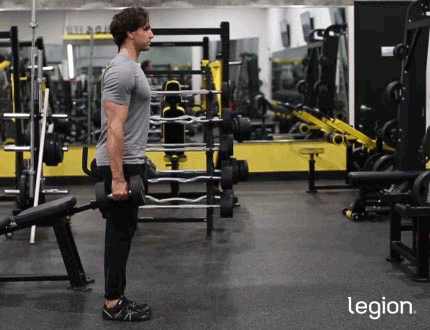
Why: The dumbbell lunge trains all your lower-body muscle mass and, as a result of it’s a dynamic train that requires extra steadiness and coordination than most leg workout routines, it additionally engages smaller stabilizer muscle mass all through your physique.
Learn how to:
- Maintain a dumbbell in every hand and stand with ft hip-width aside.
- Take an extended step ahead together with your proper foot, about 2-to-3 ft.
- With most of your weight in your proper leg, decrease your physique till your left knee touches the ground.
- Push off the ground together with your proper foot and lean barely again, straightening your legs.
- As soon as standing, convey your proper foot again to the beginning place.
READ MORE: Learn how to Lunge: Kind, Advantages, and Variations
6. Entice-Bar Deadlift
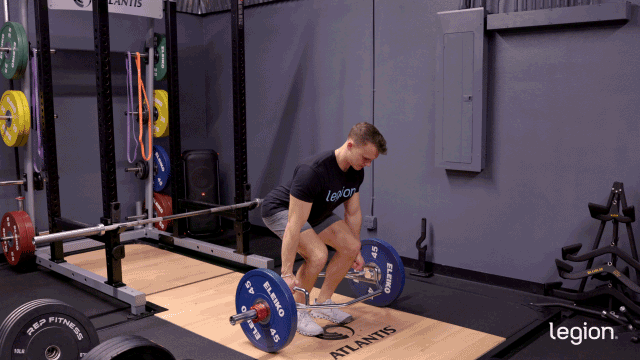
Why: The trap-bar deadlift engages the quads considerably greater than different deadlift variations, and it trains the decrease again and glutes to a excessive diploma, making it essentially the most comparable deadlift to the squat and a viable squat different.
Learn how to:
- Place your ft shoulder-width aside within the heart of the lure bar.
- Hinge at your hips, barely arch your decrease again, and grip the handles.
- Push by your heels to drive your physique upward and barely again.
- Reverse the motion and return and the beginning place.
READ MORE: Learn how to Entice-Bar Deadlift with Correct Kind (with a Free 12-Week Coaching Plan!)
7. Romanian Deadlift
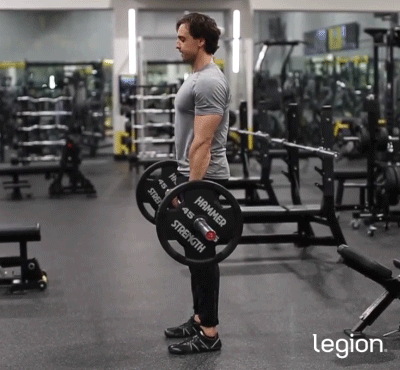
Why: The Romanian deadlift is a wonderful again squat different for creating the posterior chain (the muscle mass on the again of your physique), particularly the glutes, hamstrings, and decrease again muscle mass.
If the Romanian deadlift bothers your decrease again, however you wish to develop your hamstrings, strive the leg curl as an alternative.
Learn how to:
- Stand holding a barbell with a shoulder-width overhand grip (palms dealing with you).
- Hinge at your hips, conserving your again flat, and decrease the bar in a straight line, letting your hips transfer backward.
- While you really feel a stretch in your hamstrings, bend your knees barely and preserve reducing the barbell till your again begins to spherical.
- Reverse the motion and return to the beginning place.
READ MORE: Learn how to Do the Romanian Deadlift: Kind, Advantages, and Variations
8. Belt Squat
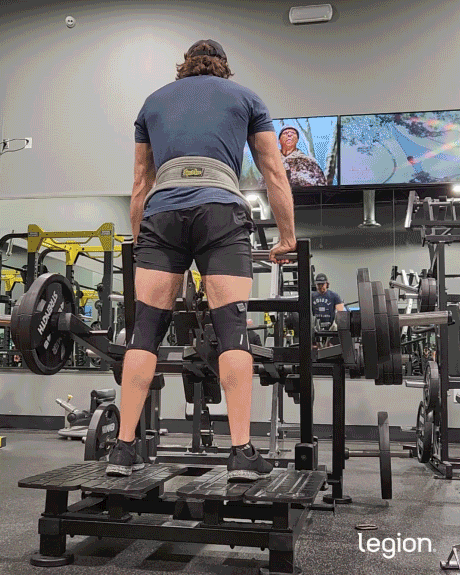
Why: The belt squat is a secure train that permits you to squat heavy weights with out loading your backbone. As such, it’s usually much less fatiguing and simpler to get well from than barbell squatting, so you are able to do it extra typically with out sporting your self out.
Learn how to:
- Stand on the platform dealing with the machine and loop the belt round your waist.
- Squat all the way down to hook the belt to the machine, then place your ft wider than shoulder-width, with toes pointing barely out.
- Seize the machine deal with with each fingers, straighten your legs to raise the load, and pull the deal with to launch it.
- Maintaining your again straight, sit down and push your knees out according to your toes.
- Get up and return to the beginning place.
READ MORE: Learn how to Belt Squat for Quad Power & Mass
9. Goblet Squat
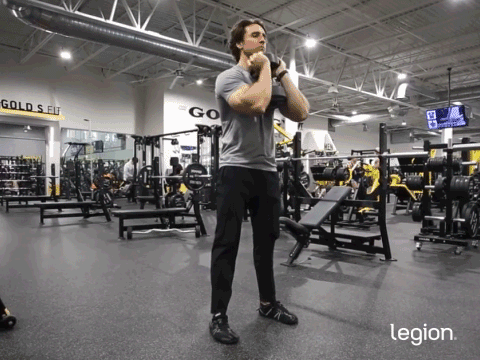
Why: The goblet squat is an efficient train for coaching your lower-body muscle mass, notably your quads. Since you maintain the load in your fingers relatively than throughout your shoulders, it’s additionally simpler in your again than different squat variations.
What’s extra, the goblet squat permits you to apply squatting with mild weights for top reps, making it very best for newcomers. And because it requires little tools and house, it’s additionally an excellent barbell squat different for at-home exercises.
Learn how to:
- Maintain a dumbbell in entrance of your chest with each fingers.
- Place your ft barely wider than shoulder-width aside, level your toes out to the aspect at a few 45-degree angle, elevate your chest, and sit down.
- Bear in mind to maintain your again straight and push your knees out in the identical path as your toes all through every rep.
- Get up and return to the beginning place.
READ MORE: Goblet Squat: Kind, Kind, Muscle mass Labored, & Widespread Errors
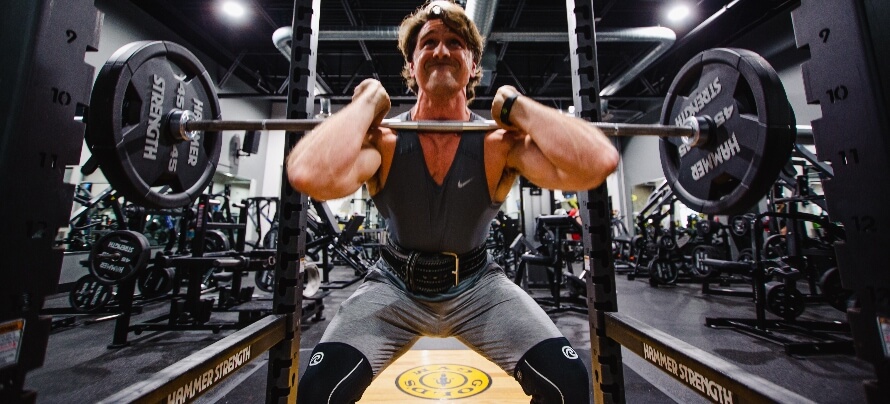
FAQ #1: What’s the greatest different to squats?
There’s no single “greatest” squat different—it actually depends upon your targets and circumstances. As an illustration, the very best squat options for at-home exercises are usually dumbbell workout routines just like the Bulgarian break up squat, lunge, or goblet squat since these workout routines require the least tools and house.
Nonetheless, if you would like an different for gaining most mass and energy, an train that permits you to raise heavy weights safely and progress commonly might be higher. On this case, the entrance squat, leg press, or belt squat could be extra becoming.
FAQ #2: Can I construct legs with out squats?
Sure, you possibly can construct spectacular legs with out ever squatting. Whereas squats are an excellent train for gaining decrease physique mass, the options mentioned above will give comparable outcomes.
FAQ #3: What are the very best at-home barbell again squat options?
The perfect barbell squat options for at-home coaching are the Bulgarian break up squat, step-up, lunge, dumbbell Romanian deadlift, and goblet squat. These workout routines solely require dumbbells, making them very best for house exercises the place barbells or machines aren’t out there.
For those who don’t have any tools, you possibly can nonetheless construct leg mass and energy with body weight options just like the body weight squat, pistol squat, and sissy squat. Simply keep in mind that to proceed gaining measurement and energy, it’s important to problem your muscle mass with progressively heavier weights over time.
In different phrases, whereas these body weight squats would possibly work initially, you’ll probably must get some dumbbells or bands to proceed making features.
RELATED: What Is Progressive Overload Coaching?
Scientific References +
- Yavuz, Hasan Ulas, et al. “Kinematic and EMG Actions throughout Entrance and Again Squat Variations in Most Masses.” Journal of Sports activities Sciences, vol. 33, no. 10, 29 Jan. 2015, pp. 1058–1066, www.growkudos.com/publications/10.1080percent25252F02640414.2014.984240/reader, https://doi.org/10.1080/02640414.2014.984240.
- Gullett, Jonathan C, et al. “A Biomechanical Comparability of Again and Entrance Squats in Wholesome Skilled People.” Journal of Power and Conditioning Analysis, vol. 23, no. 1, Jan. 2009, pp. 284–292, journals.lww.com/nsca-jscr/fulltext/2009/01000/A_Biomechanical_Comparison_of_Back_and_Front.41.aspx, https://doi.org/10.1519/jsc.0b013e31818546bb.
- Jones, Margaret T, et al. “Results of Unilateral and Bilateral Decrease-Physique Heavy Resistance Train on Muscle Exercise and Testosterone Responses.” Journal of Power and Conditioning Analysis, vol. 26, no. 4, Apr. 2012, pp. 1094–1100, https://doi.org/10.1519/jsc.0b013e318248ab3b.
- DeFOREST, Bradley A., et al. “Muscle Exercise in Single- vs. Double-Leg Squats.” Worldwide Journal of Train Science, vol. 7, no. 4, 2014, pp. 302–310, pubmed.ncbi.nlm.nih.gov/27182408/.
- Liao, Kai-Fang , et al. Results of Unilateral vs. Bilateral Resistance Coaching Interventions on Measures of Power, Leap, Linear and Change of Route Velocity: A Systematic Evaluation and Meta-Evaluation. 3 July 2021, pp. 2022;39(3):485-497, https://doi.org/10.5114/biolsport.2022.107024.
- Neto, Walter Krause, et al. “Gluteus Maximus Activation throughout Widespread Power and Hypertrophy Workouts: A Systematic Evaluation.” Journal of Sports activities Science and Medication, vol. 19, no. 1, 1 Mar. 2020, pp. 195–203, www.researchgate.web/publication/339302672_Gluteus_Maximus_Activation_during_Common_Strength_and_Hypertrophy_Exercises_A_Systematic_Review.
- Simenz, Christopher J., et al. “Electromyographical Evaluation of Decrease Extremity Muscle Activation throughout Variations of the Loaded Step-up Train.” Journal of Power and Conditioning Analysis, vol. 26, no. 12, Dec. 2012, pp. 3398–3405, https://doi.org/10.1519/jsc.0b013e3182472fad.
- Appleby, Brendyn , et al. Specificity and Switch of Decrease-Physique Power: Affect of Bilateral or Unilateral Decrease-Physique Resistance Coaching. Feb. 2019, pp. 33(2):p 318-326, https://doi.org/10.1519/JSC.0000000000002923.
- Marchetti, Paulo H., et al. “Stability and Decrease Limb Muscle Activation between In-Line and Conventional Lunge Workouts.” Journal of Human Kinetics, vol. 62, no. 1, 13 June 2018, pp. 15–22, content material.sciendo.com/view/journals/hukin/62/1/article-p15.xml, https://doi.org/10.1515/hukin-2017-0174.
- Ebben, W., et al. “Muscle Activation throughout Decrease Physique Resistance Coaching.” Worldwide Journal of Sports activities Medication, vol. 30, no. 01, 30 Oct. 2008, pp. 1–8, https://doi.org/10.1055/s-2008-1038785.
- Swinton, Paul A, et al. “A Biomechanical Evaluation of Straight and Hexagonal Barbell Deadlifts Utilizing Submaximal Masses.” Journal of Power and Conditioning Analysis, vol. 25, no. 7, July 2011, pp. 2000–2009, https://doi.org/10.1519/jsc.0b013e3181e73f87.
- Collins, Kyle S., et al. “Variations in Muscle Exercise and Kinetics between the Goblet Squat and Landmine Squat in Males and Girls.” Journal of Power and Conditioning Analysis, vol. Publish Forward of Print, no. 10, 2 Aug. 2021, https://doi.org/10.1519/jsc.0000000000004094.